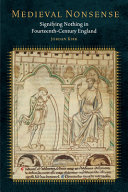

Most ebook files are in PDF format, so you can easily read them using various software such as Foxit Reader or directly on the Google Chrome browser.
Some ebook files are released by publishers in other formats such as .awz, .mobi, .epub, .fb2, etc. You may need to install specific software to read these formats on mobile/PC, such as Calibre.
Please read the tutorial at this link: https://ebookbell.com/faq
We offer FREE conversion to the popular formats you request; however, this may take some time. Therefore, right after payment, please email us, and we will try to provide the service as quickly as possible.
For some exceptional file formats or broken links (if any), please refrain from opening any disputes. Instead, email us first, and we will try to assist within a maximum of 6 hours.
EbookBell Team

4.0
56 reviewsThis book shows that, to the contrary, the foundational object of study of medieval linguistic thought was vox non-significativa, the utterance insofar as it means nothing whatsoever, and that this fact was not lost on medieval writers of various kinds. In a series of close and unorthodox readings of works by Priscian, Boethius, Augustine, Walter Burley, Geoffrey Chaucer, and the anonymous authors of the Cloud of Unknowing and St. Erkenwald, it inquires into the way that a number of fourteenth-century writers recognized possibilities inherent in the accounts of language transmitted to them from antiquity and transformed those accounts into new ideas, forms, and practices of non-signification. Retrieving a premodern hermeneutics of obscurity in order to provide materials for an archeology of the category of the literary, Medieval Nonsense shows how these medieval linguistic textbooks, mystical treatises, and poems were engineered in such a way as to arrest the faculty of interpretation and force it to focus on the extinguishing of sense that occurs in the encounter with language itself.